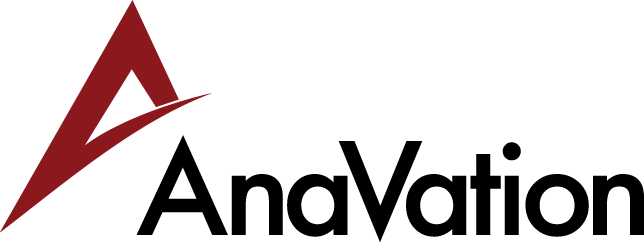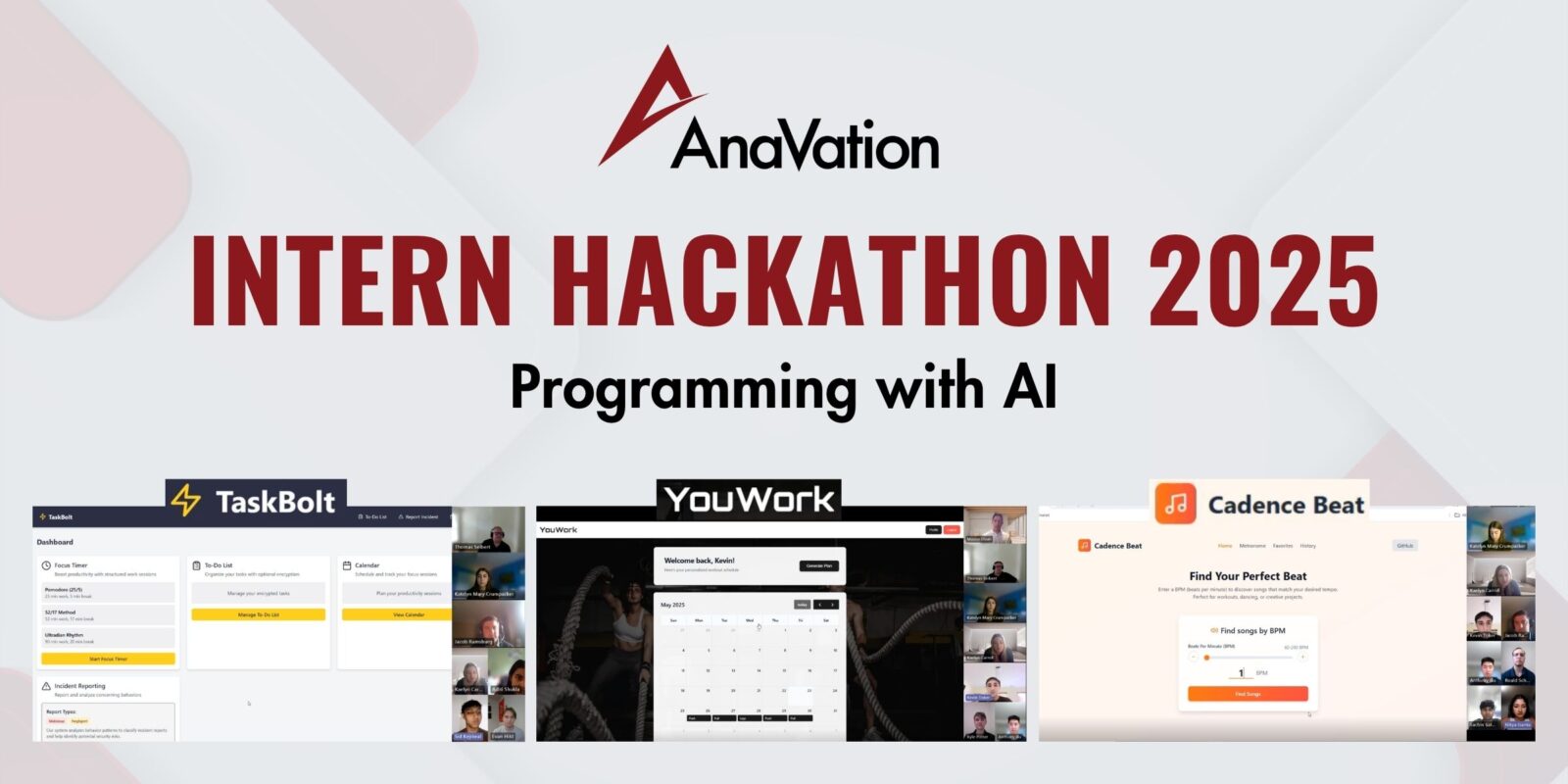AnaVation kicked off our internship with one of our most anticipated annual events: the Intern Hackathon. With this year’s theme “Programming with AI,” each team was challenged to explore how artificial intelligence can be harnessed to solve real-world problems through application development.
In just a week, our three intern teams — TaskBolt, YouWork, and Cadance Beat — brainstormed, coded, and refined their applications, culminating in a series of impressive demos that showcased not only their technical talents but also their adaptability and teamwork. Each group tackled a unique challenge and walked away with valuable insights into the strengths and limitations working with AI in the development process.
Team TaskBolt
Team TaskBolt’s goal was to build an application that improves employee productivity while simultaneously strengthening workplace security. To support productivity, the app allows users to create or select predefined focus sessions — such as the Pomodoro Technique, the 52/17 method, or ultradian rhythm intervals — to better manage their time. Users can schedule these sessions using a built-in calendar and track tasks through a personalized to-do list. Team TaskBolt took this a step further by securing the to-do list with encryption tied to a user-specific key, ensuring sensitive task information remains protected. In addition, the app includes a reporting feature that allows employees to flag behaviors that could be classified as negligent or malicious, encouraging a safer digital environment.
In developing their application, the TaskBolt team leveraged AI to accelerate the setup process, streamline database integration, and simplify deployment. They found that AI allowed them to focus more on the design and functionality of the app while enhancing their communication skills through prompt refinement. However, they also identified key limitations. Overreliance on AI occasionally led to structural decisions that limited flexibility, and ambiguous prompts sometimes produced unintended results. Version control and growing dependency complexity also highlighted the continued need for human oversight to maintain flexibility and quality throughout the development process.
Team YouWork
Team YouWork aimed to create a fitness platform that offers tailored individual workout plans. Their goal was to support a growing health-focused community and ensure accessibility across all devices. The application enables users to manually log workouts or automatically generate customized plans with AI. A calendar interface displays scheduled sessions, allowing users to track their progress. The team prioritized data protection by ensuring account creation and profile access are secure. The app was intended to be for cross-platform use, offering a consistent experience on desktop, tablet, and mobile.
YouWork was leveraged using the MERN tech stack — MongoDB, Express, React, and Node.js. Utilizing AI helped generate boilerplate code, debug quickly, and allowed developers to focus more time on user experience and application logic. While AI significantly increased development speed and encouraged creative thinking, the YouWork Team also faced challenges. Some AI-generated code was difficult to understand or debug, which slowed development at key stages. Additionally, there were data security concerns regarding collecting personal data and risks for breaches or misuse if not properly secured. They also noted that AI occasionally made design choices that conflicted with their intended user experience.
Team Cadance Beat
Cadance Beat focused on enhancing the running experience through music, designing an application that helps runners maintain pace, build endurance, and enjoy their workouts. The app allows users to select music playlists based on specific beats per minute (BPM), aligning with their preferred running pace. Users can create favorite playlists, queue songs, or opt for a metronome-style beat. A history page tracks run durations, songs played, and average BPM, offering insights for performance improvement and easy sharing with friends.
Built using React, TypeScript, Vite, and CSS, the Cadance Beat Team featured a polished interface and responsive design. The team used AI to help navigate new technologies and frameworks, complete UI updates efficiently, and support documentation through in-code comments. Although the team encountered challenges with AI-generated logic, particularly when trying to fine-tune features such as displaying BPM data in the favorites list. As dependencies grew, editing or expanding features became more difficult, highlighting the importance of developer familiarity with the codebase and careful dependency management.
All three teams delivered outstanding presentations, impressing our judges with their creativity and team collaboration skills. We are reminded why fresh perspectives and emerging talent are vital to innovation. From productivity tools to fitness platforms and running apps with rhythm, our interns didn’t just code — they created. Through hands-on experience, our interns not only built real-world applications but also explored the capabilities and limitations of AI in development.
We’re incredibly proud of what these teams achieved in just a week and can’t wait to see how their ideas — and careers — continue to grow. Congratulations to our Summer 2025 interns on a fantastic hackathon! Stay tuned for more updates from our interns at AnaVation!





